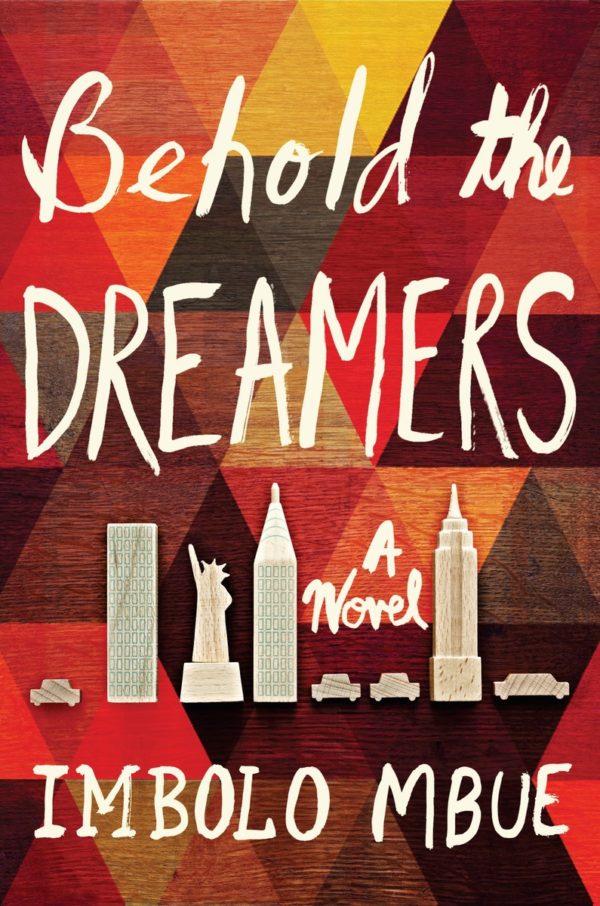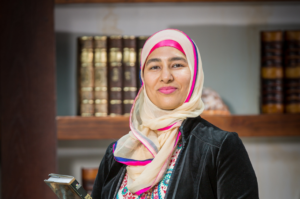Imbolo Mbue opens Behold the Dreamers with a quote from Deuteronomy in which Moses speaks of a future arrival in “a good land” abundant with food and wealth. Mbue places this archetypal story of migration at the heart of her novel so that she could reinvent the way we tell stories of how people move about in the world—in particular a globalized world—and the notions of the future that drive them.
The novel demonstrates Mbue’s ability to breathe new life into the all too familiar genre of the immigrant novel. In the classic immigrant fiction, the immigrant is often the one for whom the dream of a promise land is a risk. Drama and tension exists in that wilderness of desire and expectation separating Egypt from Canaan, the homeland of suffering from the new country of possibilities. Mbue complicates this simple binary by portraying the life of a Cameroonian man who finds himself in New York City in the wake of the 2008 housing market crash. This is not a novel about the cliché figure of the immigrant with broken dreams. It is about the awkwardness of attempting to build a new life in a city nursing its own broken dreams—a land “weeping for the end of many dreams.”
In one of the novel’s opening scenes, Jende walks into Edward Clarke’s office. He is draped in a “green double-breasted pinstripe suit”—a garish remnant of his past life in a provincial seaside Cameroonian town. Clarke is a Lehman Brothers executive. Time is not something he has in abundance. The interview is brisk and to the point. Jende is offered the job as Clarke’s personal chauffeur. Jende now has good, steady income doing a job that involves wearing a black suit, carrying a briefcase and circulating within the intimate world of New York City’s financial demi-gods. The American dream seems so tantalizingly within grasp—he can afford to pay for his wife, Neni’s, college education, which will open more financial doors for the family and grant them access into middle class American life symbolized in the acquisition of a home.
But as Jende and Neni delight in their dreams for a better life, the American housing market is busy trading fantasies for dollars in one of the biggest pyramid schemes of our contemporary moment. In a matter of months, the housing market goes burst. New York City is a post-apocalyptic world of lost homes and worthless mortgages. And Jende has to decide: should he live out the trauma of a world riddled with broken dreams? Or seek out other avenues for imagining a new future?
At this point, Mbue does something brilliant and unique to African writing. She takes something as personal, private, and subjective as the dream for a better life and shows us just what is devastatingly collective about it. Jende’s and Neni’s dreams may seem private, but they are hard wired into this external, abstract thing called the housing market. What we imagine to be individual desires—the immigrant’s dream for belonging and legal status, the citizen’s dream of a middle-class life—are all tied to a larger machinery of dreams controlled by capital and political order. When this order falls apart, as it does, in the 2008 crisis, it takes down with it the possibility of individuals fulfilling their private dreams for a house, a job, a vacation, a greed card, a husband’s love, a wife’s devotion, and so on. Behold the Dreamers is a testimony to what it means to live in the midst of such a colossal wreckage of dreams.
Behold the Dreamers is also beautifully Achebean. “America is the center of the world,” Jende says to his wife as they sit below the statue of Columbus in Columbus Circle. “Columbus Circle is the center of Manhattan. Manhattan is the center of New York. New York is the Center of America and America is the center of the world. So we are sitting in the Center of the world, right?” This is one of the most Achebean moments in the novel. Underneath this image of America as a durable center holding the world in neatly drawn concentric circles is the freakish force of the housing market set to destabilize global economy. Mbue’s New York City recalls Achebe’s enduring image of a community falling apart at the moment it imagines itself to be the center of the world.
With novels like Behold the Dreamers and, to some extent, Chimamanda Adichie’s Americanah, we seem to be turning a new chapter in the evolution of immigrant fiction. Immigrant fiction classics like Joy Luck Club and How the Garcia Girls Lost their Accent paint a picture of immigrant life as one of cultural dislocation due to the the loss of an original home. The mix of globalization and advancement in social media technology has reordered the world in such a way that the old opposition between home and exile has been splintered and redistributed. In a globalized world, movement does not always mean dislocation. Every part of the world is accessible from anywhere. The world is fragmented, but it is also hyper connected. For a Cameroonian living in New York City, the home country is a spotify playlist away or a Facebook newsfeed away. When Jende, Neni, and their West African friends are munching on Egusi soup, Attieke, poulet DG, jollof rice and dancing to Meiway’s “200% Zoblazo,” Cameroon is close, so much closer than Neni felt when she first walked into Mr. Clarke’s South Hampton mansion. In a globalized world, distance is not always a question of geography. The distance between Cameroon and New York City is nothing compared to the chasm that separates South Hampton and Harlem. It is this complex handling of space that makes a novel like Behold the Dreamers so much more nuanced than classic immigrant novels.
It’s no longer a secret that African fiction is in-demand on the global literary market. The Cameroon-born Mbue made news when word came out that she signed a million-dollar book deal with Random House for her debut manuscript. She became an instant celebrity and Behold the Dreamers one of the most anticipated novels of the year. The beauty of a novel like Behold the Dreamers is that it confirms our suspicions about the reason for this demand. Like Teju Cole’s Open City, Lauren Beukes’ The Shinning Girls, Fiston Mujila’s Tram 83, and many others, Behold the Dreamers is proof that the global literary market is developing a taste for African novels doing interesting things at the level of storytelling and form. The days of rehearsing canned themes and subject matters just might be over. African writers are all about aesthetic innovation, and the world is taking notice.
Get the book HERE.










Naija Girl Abroad August 02, 2017 20:23
*puts book on hold at local library*